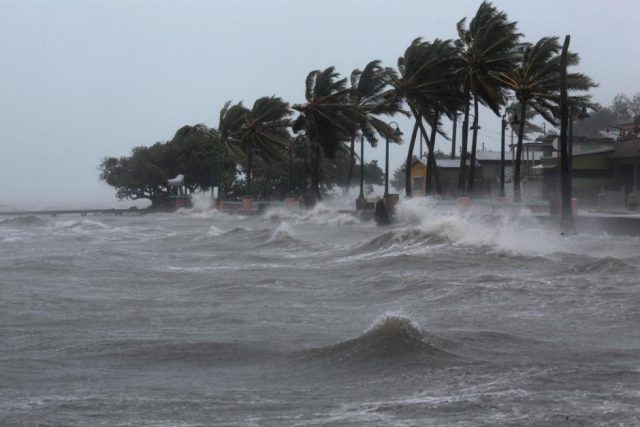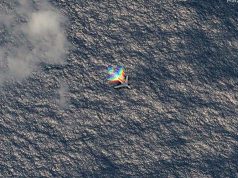
SAN JUAN, Puerto Rico — Potentially catastrophic Hurricane Irma clobbered Caribbean islands with pounding winds, rain and surging surf on Wednesday as officials in Florida called for evacuations ahead of the storm’s expected landfall there this weekend.
Irma could become the second powerful storm to thrash the U.S. mainland in as many weeks, but its precise trajectory remained uncertain. Hurricane Harvey killed about 60 people and caused as much as $180 billion in damage after hitting Texas late last month.
The eye of Irma, a Category 5 storm with winds of 185 miles per hour (295 km per hour), was passing over the northernmost Virgin Islands on Wednesday afternoon after crossing the half-French, half-Dutch island of St. Martin, the U.S. National Hurricane Center said. Category 5 is its highest category.
On its current path the core of Irma, which the Miami-based center said was the strongest Atlantic storm on record, was expected to pass near or just north of Puerto Rico on Wednesday before scraping the north coast of the Dominican Republic on Thursday.
Karel van Oosterom, the Netherlands ambassador to the United Nations, said Irma had hit the Dutch islands of Saba and Saint Eustasius before overrunning St. Martin.
“First information indicates that a lot of damage has been done, but communication is still extremely difficult,” he said at a U.N. meeting.
Irma began lashing Puerto Rico with rain at mid-morning. Governor Ricardo Rossello told residents to stay inside as the storm bore down on the island. “There is no reason to be in the street,” Rossello told a midday press conference.
Many businesses in the capital San Juan were closed and many buildings were covered with storm shutters. Occasional shoppers were out making final purchases of water, ice and food to prepare for what could be several days without power.
Rene Franco, a 37-year-old medical student, said he had still not decided whether to flee to a shelter.
“I feel ready. I bought groceries. I bought water — too much water,” he said as he walked his 12-year-old dog Heaven before the storm arrived. “In the past I have always stayed in my house but this time it depends. It depends on the waves and the water. This is a very difficult storm.”
Roofs blown off
After Irma battered the island nation of Antigua and Barbuda, emergency officials reported three injuries and minimal damage, with some roofs blown off. Prime Minister Gaston Browne said flights would resume from the airport Wednesday afternoon.
Many of the Caribbean’s Leeward Islands were under a hurricane watch, including the Turks and Caicos Islands and the southeastern Bahamas, the NHC said.
In Paris, the French government said it had delivered water and food to two overseas territories, St. Martin and St. Barthelemy, and that emergency response teams would be sent once the storm had passed.
Power was knocked out on both islands, according to prefecture officials on Guadeloupe. At least four buildings were damaged and low-lying regions had been flooded, French Interior Minister Gerard Collomb said.
The U.N. World Food Program prepared to provide emergency aid to Haiti if it was hit by Irma. The country was ravaged by a 2010 earthquake and Hurricane Matthew last year.
U.S. President Donald Trump said he and aides were monitoring Irma’s progress. “But it looks like it could be something that will be not good. Believe me, not good,” he told reporters at the White House.
Trump, whose Mar-a-Lago estate in Palm Beach, Florida, could take a direct hit from the storm, has already approved emergency declarations for Florida, Puerto Rico and the U.S. Virgin Islands, mobilizing federal disaster relief efforts.
Florida Governor Rick Scott said Irma could be more devastating than Hurricane Andrew, a Category 5 storm that struck the state in 1992 and still ranks as one of the costliest ever in the United States.
Residents of the Florida Keys, a resort archipelago at the state’s southern tip, were ordered to leave by Wednesday evening. Residents of low-lying areas in densely populated Miami-Dade County were urged to move to higher ground.
“We can expect additional evacuations as this storm continues to come near our state,” Scott said at a news conference in the Keys.
He said 7,000 National Guard troops would report for duty on Friday, ahead of the storm’s expected arrival.
In South Carolina, Governor Henry McMaster also declared a state of emergency and urged residents to prepare for Irma’s potential landfall there.
“It’s too soon to rule out any possibilities,” said Kim Stenson, director of the South Carolina Emergency Management Division. “Hurricane Irma is a dangerous storm and its projected path could put South Carolina in harm’s way. Fortunately, people in South Carolina have time.”
Irma ranked as one of the five most powerful Atlantic hurricanes in the last 80 years and the strongest Atlantic storm recorded by the NHC outside the Caribbean Sea and Gulf of Mexico.









